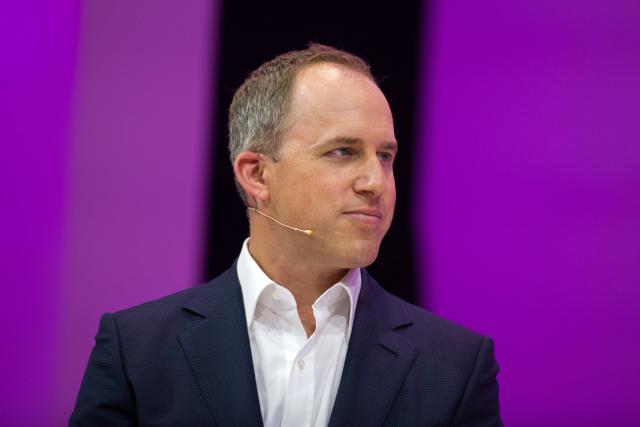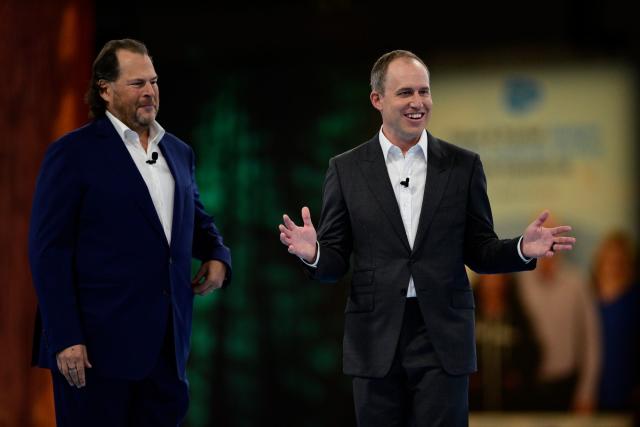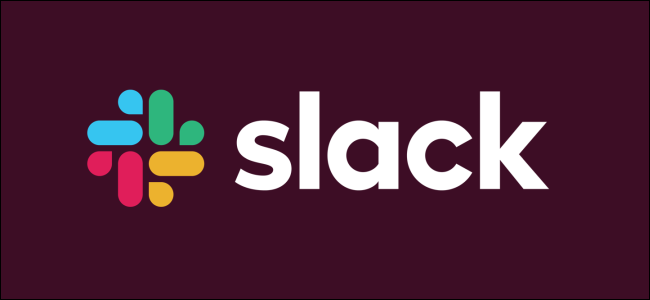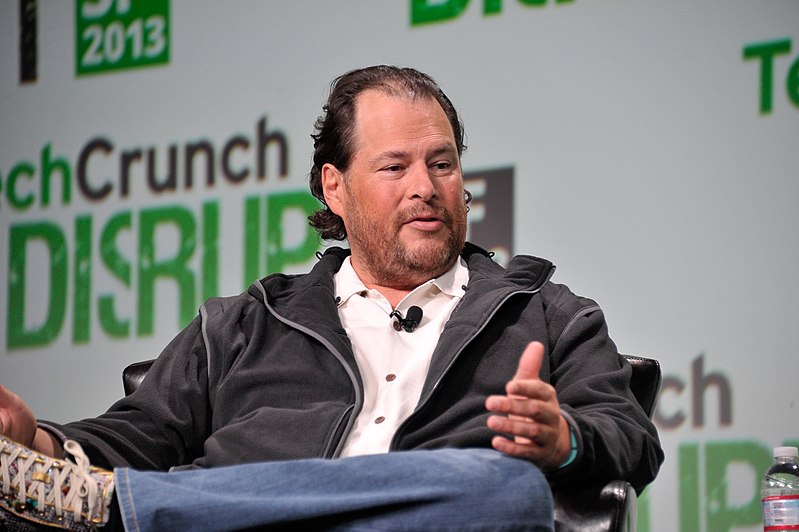Salesforce Looks to Informatica to Boost Data Capabilities

I am a law graduate from NLU Lucknow. I have a flair for creative writing and hence in my free time work as a freelance content writer.

I am a law graduate from NLU Lucknow. I have a flair for creative writing and hence in my free time work as a freelance content writer.
Salesforce, the renowned business software provider, has announced the appointment of Sabastian Niles, a prominent activist lawyer from Wachtell, Lipton, Rosen & Katz, as its new chief legal officer. Niles played a vital role in defending Salesforce against several hedge funds that were advocating for changes within the company.
The addition of Niles to Salesforce’s management team was welcomed by CEO Marc Benioff, who expressed his excitement about the new hire. Niles brings a wealth of experience and expertise in dealing with corporate legal matters and navigating the complexities of activist investments.

Wachtell, Lipton, Rosen & Katz is widely recognized as a leading law firm that handles merger deals and addresses the demands of activist investment firms.
Over the course of his nearly 17-year career at the firm, Niles successfully advised corporations facing pressure from influential activist investors such as Bill Ackman’s Pershing Square Capital Management, Jeffrey Ubben, and Mason Morfit’s ValueAct Capital Management.
Niles joined Wachtell as a summer associate after obtaining his law degree from Harvard. His dedication and skills allowed him to ascend the ranks and eventually become a partner at the esteemed law firm. His impressive track record in handling high-stakes legal matters made him a valuable asset to the team.
Also Read: Meta now lets you make video calls using a cartoon avatar
Notably, Niles was involved in providing legal counsel to Salesforce when it faced pressure from Starboard Value, ValueAct, and Elliott Investment Management earlier this year. These prominent activist investors had urged the company to implement significant changes. Niles’ expertise played a crucial role in guiding Salesforce through this challenging period.
Despite his recent appointment, Niles has refrained from commenting on his new position at Salesforce. Reuters reached out to him for a statement, but he did not respond.
Sebastian Niles specializes in securities litigation and enforcement matters. He is a partner at the law firm Wachtell, Lipton, Rosen & Katz, based in New York City. Niles has extensive experience representing clients in complex securities litigation cases, internal investigations, and regulatory enforcement actions. He has worked on notable cases involving corporate governance, shareholder activism, and securities fraud.
With Niles joining Salesforce as chief legal officer, the company is well-positioned to navigate legal complexities and address potential challenges in the future. His extensive experience in dealing with activist investors and his legal acumen make him an ideal choice for the role. Salesforce continues to strengthen its management team with top-tier talent, ensuring the company’s ability to thrive in an ever-evolving business landscape.

I am a law graduate from NLU Lucknow. I have a flair for creative writing and hence in my free time work as a freelance content writer.
Together with departing Google vice president Clay Bower, Bret Taylor, who just quit as co-CEO of Salesforce Inc., is creating an artificial intelligence firm.
In a LinkedIn post, Bavor, who worked for Google for over seven years as the vice president of augmented reality and virtual reality as part of an 18-year career, was vague about his future plans but made it apparent that he is working with Bret Taylor.

Since the two of them joined Google together years ago, he claimed that they had known one another for a long time. He stated that he has “always admired [Taylor’s] keen product sense and entrepreneurial spirit, his technical chops, and, above all, his character and integrity.”
Bavor stated, “We share an obsession with recent advances in AI, and we’re excited to build a new company to apply AI to solve some of the most important problems in business,” possibly teasing what may happen next. Will there be an AR/VR component? Right now, it’s tough to say, but the two are working on something.
He wasn’t being detailed, but next month we could learn more about whatever it is. He noted, “I’ll be setting out with Bret on this next adventure in March, and will have more to share once we get started. Until then, I’ll be focusing on transitioning my teams and projects, and wrapping things up properly at Google.”
Also Read: Salesforce co-CEO Taylor to leave as Benioff takes sole charge
Prior to embarking on an entrepreneurial path and launching the pioneering social network FriendFeed in 2007, Taylor worked at Google for four years beginning in March 2003. In 2009, Facebook bought the company where Taylor served as CTO for a while.
Later, he founded Quip, a business document collaboration platform that Salesforce purchased in 2016 for $750 million. He climbed the ranks to become co-CEO and is now going back to his entrepreneurial origins of business development.
Bavor, who joined Google in 2005, advanced through the organization’s ranks to become a manager on Gmail and Google Drive. He is regarded as Sundar Pichai’s preferred lieutenant.
Bavor was chosen to lead Google’s virtual reality division in 2015 in an effort to outperform competitors regarding the next computer platform. Although Google has introduced a number of devices and waves of software, its products have not been widely adopted, and the corporation has pulled back from this market.
A company spokesperson stated that Google had no plans to announce a replacement for Bavor. Projects from the laboratories devoted to cutting-edge technology will be transferred to Google’s Tech & Society division, which is run by senior vice president James Manica. Executives from Google Hiroshi Lockheimer and Rick Osterloh will be in charge of the augmented reality lab projects.
Also Read: Samsung, Google & Qualcomm team up on mixed-reality platform
Bavor recently wrote an email outlining changes to Google’s R&D initiatives within the Google Labs division, which housed the business’s internal incubator Area 120. After a reorganization in 2021, Bavor was the head of Labs, although many of its innovative initiatives were severely harmed by Alphabet’s widespread layoffs.

I am a law graduate from NLU Lucknow. I have a flair for creative writing and hence in my free time work as a freelance content writer.
Salesforce Inc announced on Wednesday that co-CEO Bret Taylor will step down from the position in January and also that co-founder Marc Benioff will take over as sole CEO.

Investors simply brushed off the annual profit increase, sending the company’s shares down the pit by 7 percent in extended trading.
According to Steve Koenig, managing director at SMBC Nikko Securities, investors likely assumed Taylor’s appointment was the start of a long tenure as Salesforce’s operational CEO.
“His departure raises questions about why he’s leaving and how operational leadership will be divided and delegated,” he added.
Source: thestar.com.my
Taylor became the co-CEO in November 2021 and priorly served as a chief operating officer (COO) and chief product officer (CPO) of Salesforce company.
Read More: Marc Benioff, Founder, and CEO of Salesforce
He was a major contributor behind Salesforce’s 27.7 billion USD workspace messaging platform takeover i.e. Slack Technologies.
“After a lot of reflection, I’ve decided to return to my entrepreneurial roots,” Taylor said.
Source: thestar.com.my
Benioff said that it is “bittersweet” that Taylor has decided to step down as his Co-CEO. “Taylor made his mark on Salesforce as an incredible technologist, leader and friend to us all. Bret founded two incredible companies so it’s understandable why he wants to return to his entrepreneurial roots.”
Source: latestly.com
Taylor, a co-creator of Alphabet Inc’s Google Maps, is also credited with developing Meta Platform Inc unit Facebook’s “like” button while serving as the social media giant’s (CTO) chief technology officer.
The firm based in San Francisco expects yearly adjusted profit per share to range between $4.92 and $4.94, up from $4.71 to $4.73 previously forecast.
According to Refinitiv IBES data, earnings for the quarter that ended Oct. 31 was 7.84 billion USD, compared to an average expectation of the analyst of 7.82 billion USD.
Salesforce has attracted customers with a broad portfolio that comprises its Customer 360 platform and messenger app Slack at such a time when digital transformation has become a priority, even as businesses it is said to be prepared for a major economic turndown.
The firm’s income for the current quarter is expected to range somewhere around 7.93 billion USD to 8.03 billion USD.
It earned 1.40 USD per share on an adjusted basis in the third quarter, particularly in comparison to the $1.21 expected.

I am a student pursuing my bachelor’s in information technology. I have a interest in writing so, I am working a freelance content writer because I enjoy writing. I also write poetries. I believe in the quote by anne frank “paper has more patience than person
On Tuesday both Salesforce and Slack confirmed the acquisition of the latter for $27.7 billion by the software company Salesforce. This acquisition will mark one of the biggest business deals in the software industry and also the biggest in the history of Salesforce to date. Salesforce is a cloud computing giant which after owning the new work-chat app will amplify the working connectivity globally. The company will have a better shot at giving tough competition to the tech giant Microsoft.
Salesforce was one of the earlier companies in the IT industry to sell software in the form of subscription service. This saved many small companies and individual workers the time to install the programs on PCs. But, the concept of the software subscription is not a unique idea anymore. Many companies especially the big tech giants are making such online services with lucrative packages to offer, for example, IBM and Microsoft. So, what’s Salesforce’s plan in the long run?
Slack is an application used for messaging on a professional level. It is mostly used to enable communication among a group of people (especially workplace teams) which offers more than just one-to-one chatting service. Unfortunately with Microsoft Teams into Office 365, the demand for Slack was pulled down. In July, Slack launched a complaint against Microsoft in the European Union for illegally offering Teams in Office 365 subscription. And, customers will rather prefer a subscription where they are offered more than one service and everything is connected to ease the workflow. On top of this, some of the main products of Salesforce are in tough competition with Microsoft’s to stay afloat in the market. So, what is better than making a deal to make the company bigger and better?

The experts can see clearly that for Salesforce the main target is to outrun Microsoft as the latter is moving far ahead of Salesforce in terms of cloud computing. Marc Benioff, CEO and founder of Salesforce said that “Slack is a central nervous system for so many companies” and that “it’s a match made in heaven”. But, if it is only about outrunning Microsoft not every decision of the company might be fruitful.
Salesforce is paying Slack $27.7 billion to close the deal. Under the agreements for this acquisition, the Slack shareholders will get $26.79 in cash and 0.0776 shares of Salesforce common stock for each share of Slack. And, this calculation gives an entire value of $27.7 billion according to the November 2020 closing price of Salesforce’s common stock. March believes that this acquisition and what it will lead to will become the future of enterprise software. And, as the entire world is now getting accustomed to the work-from-home habit, the two companies might have hit the jackpot after all.
Stewart Butterfield, CEO of Slack, believes that with every passing day enterprise software is becoming the core of any organization. So, to build products and services with less complexity, more flexibility, proper alignment, and organizational agility is the main goal. He also said that he believes this is the most strategic decision in the history of software.
It has been over two decades that Salesforce is providing computing solutions to customers around the globe. The company has achieved massive success and recently it is also expanding its business by several acquisitions. The company bought a data analytics specialist for $15.7 last year. The current market value of Salesforce is approximately $220 billion which is around seven-folds greater than it was almost a decade ago. Kate Leggett, an analyst predicts Salesforce made a very positive acquisition as Slack will be added to its software suite giving people a similar experience like Office 365. If there are no hiccups in the way, Salesforce will take full control of Slack by mid-2021.
Though Slack is a very handy alternative for email and other online communication, it is not as popular as it was expected to be. It is used by many companies and government agencies but not a hot deal for the investors. So, by selling it to one of the leading software companies in the world, Slack just made a perfect exit embarking on a new journey. With Slack being acquired now it will have a broad customer base of the Salesforce and attract new customers as well for the company.

Annasha Dey is an NIT student, who apart from studying engineering is also a content writer. She has a great interest in photography, writing, reading novels, and travelling as well. She is a foodie who loves socializing and hanging out with her friends. She is also a trained Kathak dancer and a big fashion enthusiast. Dey also loves watching TV series, which includes F.R.I.E.N.D.S. and Big Bang Theory. To be a better writer she prefers to read more
Talented people have the urge to make a difference in this world and create a name for themselves from quite an early age. One such genius who jumped into the entrepreneurship race from the age when he was just in high school is Marc Benioff. Influenced by his father, a Hindu guru, and a former secretary of state Marc Benioff is best known as founder of Salesforce – a cloud computing company.
Marc Benioff, son of Joelle and Russell Benioff, was born on September 25th 1964 in San Francisco and was raised in the Bay Area. Marc got his first exposure into the business world through his father’s local departmental store in San Francisco. In one of the interviews he went on to credit his father and said, “I learned my work ethic from him”. He studied high school from the Burlingame High School and during his time there he developed and sold his first software called “How To Juggle” for the TRS-80 Model 1 Computer. This trade gained him $75 from the buyer computer magazine. The next major successful turn came into Marc’s life when he was 15. This was the year when he founded his single-man company named Liberty Software dedicated to develop games for the Atari 800 computer. Under this company’s banner Benioff developed games such as “King Arthur’s Heir”, “The Nightmare”, “Crypt of the Undead”, and “Escape from the Vulcan’s Isle”. His venture of developing games became his primary source of income and by the next year Benioff was making $1500 per month which he would later use to pay for his higher studies. He graduated from High School in the year 1982 and enrolled himself into University of Southern California to pursue Bachelor of Science in Business Administration degree.
The next major successful turn came into Marc’s life when he was 15. This was the year when he founded his single-man company named Liberty Software dedicated to develop games for the Atari 800 computer. Under this company’s banner Benioff developed games such as “King Arthur’s Heir”, “The Nightmare”, “Crypt of the Undead”, and “Escape from the Vulcan’s Isle”. His venture of developing games became his primary source of income and by the next year Benioff was making $1500 per month which he would later use to pay for his higher studies. He graduated from High School in the year 1982 and enrolled himself into University of Southern California to pursue Bachelor of Science in Business Administration degree.
The USC days were of great opportunities for Benioff. He landed an internship as a programmer with the tech-genius and the greatest visionary ever lived Steve Jobs at Apple’s Macintosh division. It was here when he learned that revolutionary ideas were not just a dream but they can be pursued and achieved too. Benioff had made his mind to make his career in programming but one of his professor at USC had something else in mind. He suggested Benioff to take business. And, thus, was born an entrepreneur who would revolutionize the online world.
Marc started his career immediately after graduating from USC and joined the database giant Oracle as a customer support. Benioff had an exceptional oratory skills and this helped him to gain the “Rookie of the Year” title at the age of 23. Three years later he climbed up his career ladder so fast that he reached the Vice President position and became the youngest person to be on that post. This also gained him a fat salary of $300,000.
Benioff’s success caught an eye of the top-line people and the founder of Oracle, Larry Ellison, himself called him in. Benioff and Ellison quickly became close friends and spent a good amount of time together attending parties, going on vacations, etc. After 13 years of job at Oracle, Benioff decided to work on something of his own project. And he started working on the idea of cloud computing and gave the company a name which today is known as “Salesforce”. Ellison supported Benioff’s idea by funding the project with $2 million and took a seat on board of directors.
As the time passed by, Benioff found out a potential competitor to Salesforce and it was none other than Oracle itself. This led to the start of downfall between Ellison and Benioff’s relations. While the business war’s continued Salesforce managed to survive the huge dot-com bust blow-off in early 2000s. The survival made the company even stronger and brought it in the list of biggest companies in modern cloud computing market. The company went public in 2004 and raised $110 million. Today, the company is valued at $40 billion and has also been awarded multiple awards including the “Best Place to Work at” for 8 consecutive years.
Starting from selling a software for $75 to making a billion dollars company Marc Benioff stands at number 16 in the Forbes 500 most influential CEOs list. Besides his business work, Benioff has also written a business book “Behind the Cloud”, a memoir on Salesforce in 2009. He is actively involved in philanthropical works and donates a huge sum to charitable trusts and organizations. Benioff currently lives in San Francisco, California with his wife Lynnie Benioff and two children.

Harshal Pawar is an avid reader, a TV show addict, and a writer. He has a personal blog brainwork.wordpress.com where he jots down his articles and poetry about love and life.
He is currently pursuing film-making and wishes to bring the words written on a paper to the screen. More of all he is a scorpio.